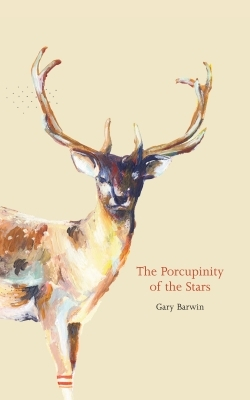
The Porcupinity of the Stars
Poetry is perhaps the most intimate literary genre, in which secrets slip loose from their hiding places. Poems sidle up close enough to whisper (hot breath, smelling of wine and garlic) in your ear. Yet poetry also hails from an ancient history of performance, when troubadours entranced their audiences with the magic and musicality of speech. Gary Barwin’s new book, The Porcupinity of the Stars, summons both these worlds, as the poet alternately pulls from his sack shy, dark-eyed shadows, and a whirling circus of words. A mesmerizing zone of enchantment unfurls, with language that possesses an acrobatic capacity to startle—cavorting on a high wire between mischief and risk.
Among contemporary poets, Barwin stands out as exceptional for his ability to plunder the synesthetic splendor of words. His poems seem to lift from the printed page and nosedive into other sensory dimensions. They are at once so spacious, intensely visual, and alert to sound that it’s possible to become convinced words are endowed with flavors and smells—exotic, fragrant candies that stain the tongue with color. Barwin writes with an inexhaustible, almost compulsive urge to riff, charged by his fluency in multiple art forms. In his creative life, he moves between poetry, fiction, composing, and performing; both his music and literature have been published and performed in his native Canada, the US, and Europe. Barwin has also collaborated with other writers, such as, in his forthcoming Kafka Franzlations: A Guide to Imaginary Parables, Hugh Thomas and Craig Conley.
Because his personal lexicon is not limited to a single sensory province, Barwin’s language defies boundaries, and makes the reader shiver in encounter with the unexpected. A solitary hush falls in such exquisite lines as: “we mist the sky with our blue plum lungs / make heaven heron-dark with our breathing / fog the limits with spirit and blue exhalation.” Much of Barwin’s poetry is simultaneously playful and disconcerting, like this deceptively austere epigraph:
do why worry we?
word every earth on is
in place perfect the
Our eyes automatically re-order this little stack of words, so that at first glance, it reads as reassurance—until a second reading reveals chaos. The human drive to make sense of things enforces meaning; yet it’s uncertain whether the perceived discernment of order is a triumph, or an artifice constructed for comfort.
An escape artist of literary convention, Barwin relishes turning the familiar inside out. He unravels beloved, oft-cited lyrics, from Frost (“Stopping by Woods on a Snowy Winter Evening”) to seventeenth-century haiku poet Masahide. Such instances are like meeting an old friend who is talking a little strangely, pulling faces, and blowing spit bubbles; we squint and look closer. In that moment, Barwin performs a resuscitation act, breathing new life into old—challenging memory to reconsider its own liturgies: “it’s not so much that Polly wants a cracker /” he writes, “but that the lark wants its small supper of sky / its late dinner of twilight among the blue leaves.”
At times, poetry (especially in traditional classroom settings) is scrutinized with a joyless earnestness and even angst. Poets themselves can be an insular, self-referential lot, so accustomed to small audiences that they risk speaking only to each other. It’s liberating, then, that Barwin indulges in lusty humor and deliciously silly images. He conjures a contemporary fairy-tale realm where anything can happen: jackets have three sleeves; groundhogs found a brass band; bakers make bread, but the yeast doesn’t care and nothing rises. He has also written for children, and this book could be read aloud around the dinner table, to nourish both literati and wiggling kids. In “One-Faced,” he writes: “don’t do it, I said / choosing a piece of toast / a perfect fried egg / but she unhooked her jaw / and swallowed the sun / now it was really dark.” Children own the capacity to imagine the lives of things, where adults may see only inert objects. Barwin has retained his ability to witness with lidless imagination.
His poems are charged with exuberant discovery. Listening to saxophonist Coleman Hawkins, he muses: “some think our ears / radiant fetuses / driving their tiny cars / on either side of the head / how do we know magnificence / the disco ball of the heart / a mosaic of shiny blood / that’s there and then not.” Under Barwin’s gaze, the world as we know it is continually stretched, jolted, and tweaked. The Porcupinity of the Stars is poetry as adventure—crampons and pup tent optional.
Reviewed by
Melanie Drane
Disclosure: This article is not an endorsement, but a review. The publisher of this book provided free copies of the book to have their book reviewed by a professional reviewer. No fee was paid by the publisher for this review. Foreword Reviews only recommends books that we love. Foreword Magazine, Inc. is disclosing this in accordance with the Federal Trade Commission’s 16 CFR, Part 255.
